Best APAP Machines for February 2026

Can't find the right APAP machine? We've compared and reviewed the top APAP brands to help make your decision easier.
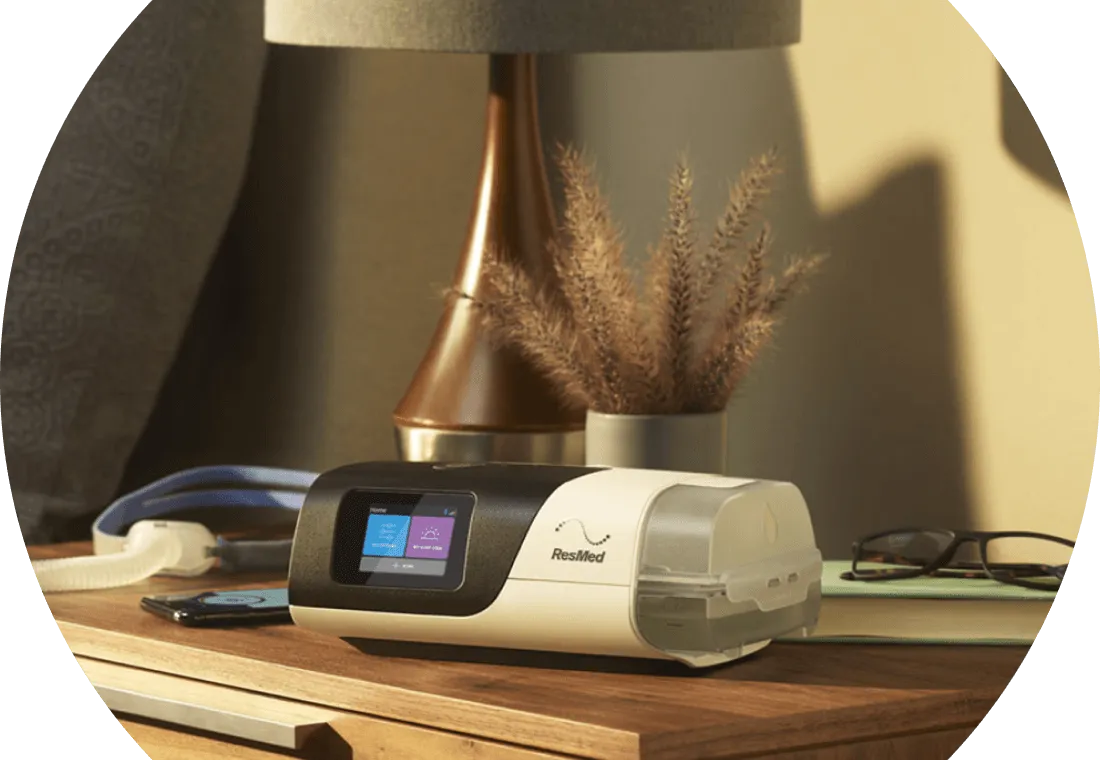
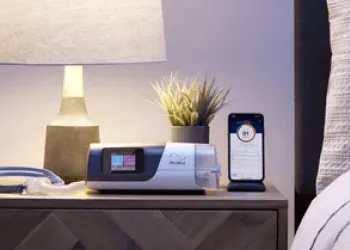

AirSense™ 11 AutoSet
- Machine automatically adjusts pressure levels based on breathing patterns
- Climate control feature lets you easily change temperature and humidity levels
- Auto-ramp and exhalation relief help you breathe more easily
- Machine automatically adjusts pressure levels based on breathing patterns
- Climate control feature lets you easily change temperature and humidity levels
- Auto-ramp and exhalation relief help you breathe more easily
Best Overall
Ideal For:
-
People who find fixed-pressure CPAP therapy uncomfortable
-
Those prone to congestion
-
Shoppers seeking a device with integrated sleep coaching
Who Should Keep Looking:
-
Shoppers with tight budgets or limited insurance coverage
-
CPAP users who don’t mind single-pressure settings
-
People with sleep apnea who haven’t tried traditional CPAP therapy
-
Regular Price
$1,299
-
Weight
2.5 lbs.
-
Warranty
2 years
-
Dimensions
3.72" x 10.71" x 5.45"
-
Noise Rating
27 dBA
Ideal For:
- People who find fixed-pressure CPAP therapy uncomfortable
- Those prone to congestion
- Shoppers seeking a device with integrated sleep coaching
Who Should Keep Looking:
- Shoppers with tight budgets or limited insurance coverage
- CPAP users who don’t mind single-pressure settings
- People with sleep apnea who haven’t tried traditional CPAP therapy
Regular Price
$1,299
Weight
2.5 lbs.
Warranty
2 years
Dimensions
3.72" x 10.71" x 5.45"
Noise Rating
27 dBA
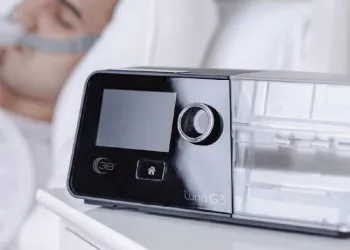

Luna G3 APAP
- Automatic pressure adjustments can help you breathe more easily during sleep
- Humidifier can be preheated prior to bedtime
- Quieter operation than the average CPAP machine
- Automatic pressure adjustments can help you breathe more easily during sleep
- Humidifier can be preheated prior to bedtime
- Quieter operation than the average CPAP machine
Best Features
Ideal For:
-
CPAP users who feel more comfortable exhaling at lower pressure settings
-
People who enjoy easing into their therapy with gradually increasing pressure levels
-
Those who prefer sleeping in relatively quiet environments
Who Should Keep Looking:
-
Those with limited insurance coverage
-
People who don’t mind standard CPAP therapy
-
Shoppers seeking a compact machine that’s conducive to travel
-
Regular Price
$917
-
Weight
2.75 lbs.
-
Warranty
2 years
-
Dimensions
10.43" × 5.70" × 4.48"
-
Noise Rating
27 dBA
Ideal For:
- CPAP users who feel more comfortable exhaling at lower pressure settings
- People who enjoy easing into their therapy with gradually increasing pressure levels
- Those who prefer sleeping in relatively quiet environments
Who Should Keep Looking:
- Those with limited insurance coverage
- People who don’t mind standard CPAP therapy
- Shoppers seeking a compact machine that’s conducive to travel
Regular Price
$917
Weight
2.75 lbs.
Warranty
2 years
Dimensions
10.43" × 5.70" × 4.48"
Noise Rating
27 dBA
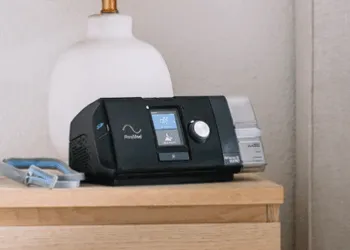

AirSense™ 10 C2C
- Card-to-cloud software sends compliance data directly to your physician
- Automatic climate control adjusts temperature and humidity levels during the night
- Ramp and EPR features improve ease of breathing
- Card-to-cloud software sends compliance data directly to your physician
- Automatic climate control adjusts temperature and humidity levels during the night
- Ramp and EPR features improve ease of breathing
Best Card-to-Cloud
Ideal For:
-
Those looking for a device that streamlines the data reporting process
-
CPAP users who feel more comfortable with flexible pressure settings
-
People who are new to CPAP therapy
Who Should Keep Looking:
-
Those who don’t need APAP therapy to sleep comfortably
-
People who prefer PAP devices without humidifiers
-
Shoppers seeking the latest generation of ResMed AirSense products
-
Regular Price
$913
-
Weight
2.75 lbs.
-
Warranty
2 years
-
Dimensions
4.57" x 10.04" x 5.91"
-
Noise Rating
27 dBA
Ideal For:
- Those looking for a device that streamlines the data reporting process
- CPAP users who feel more comfortable with flexible pressure settings
- People who are new to CPAP therapy
Who Should Keep Looking:
- Those who don’t need APAP therapy to sleep comfortably
- People who prefer PAP devices without humidifiers
- Shoppers seeking the latest generation of ResMed AirSense products
Regular Price
$913
Weight
2.75 lbs.
Warranty
2 years
Dimensions
4.57" x 10.04" x 5.91"
Noise Rating
27 dBA
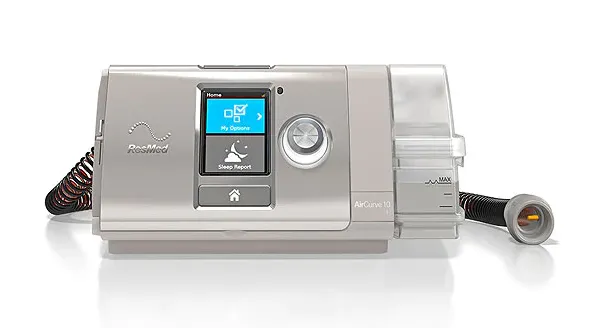

AirCurve™ 10 BiPAP
- Bi-level machine series consisting of three individual models: AirCurve 10 S, AirCurve 10 VAuto, AirCurve 10 ASV
- Climate Control feature adjusts temperature and humidity settings based on ambient levels
- myAir online support network assists new users during setup and initial therapy
- Bi-level machine series consisting of three individual models: AirCurve 10 S, AirCurve 10 VAuto, AirCurve 10 ASV
- Climate Control feature adjusts temperature and humidity settings based on ambient levels
- myAir online support network assists new users during setup and initial therapy
Best BiPAP
Ideal For:
-
People who have found standard CPAP therapy uncomfortable or unsuccessful
-
Those who breathe more easily with heated and humidified PAP equipment
-
Anyone with a diagnosis for advanced OSA, CSA, or Cheyne-Stokes Breathing
Who Should Keep Looking:
-
Those who don’t mind standard CPAP
-
People with medical conditions that preclude them from using BiPAP machines
-
Shoppers with tight budgets and limited insurance coverage
-
Regular Price
$2,249
-
Weight
2.75 lbs.
-
Warranty
2 years
-
Dimensions
4.57" x 10.04" x 5.91"
-
Noise Rating
28 dBA
Ideal For:
- People who have found standard CPAP therapy uncomfortable or unsuccessful
- Those who breathe more easily with heated and humidified PAP equipment
- Anyone with a diagnosis for advanced OSA, CSA, or Cheyne-Stokes Breathing
Who Should Keep Looking:
- Those who don’t mind standard CPAP
- People with medical conditions that preclude them from using BiPAP machines
- Shoppers with tight budgets and limited insurance coverage
Regular Price
$2,249
Weight
2.75 lbs.
Warranty
2 years
Dimensions
4.57" x 10.04" x 5.91"
Noise Rating
28 dBA
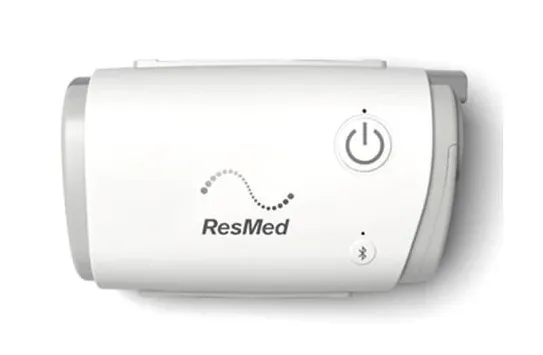

AirMini™ Auto Travel CPAP
- Compact, lightweight design makes the device travel-friendly
- Functional in three CPAP and APAP modes
- HumidX cartridges enable water-free humidification
- Compact, lightweight design makes the device travel-friendly
- Functional in three CPAP and APAP modes
- HumidX cartridges enable water-free humidification
Best for Travel
Ideal For:
-
Frequent fliers
-
People seeking a travel-friendly device that’s easy to pack
-
CPAP machine shoppers who aren’t reliant on insurance coverage
Who Should Keep Looking:
-
People who need BiPAP therapy
-
Those who don’t use compatible AirFit CPAP masks
-
Shoppers with limited budgets
-
Regular Price
$1,298
-
Weight
0.7 lbs.
-
Warranty
2 years
-
Dimensions
5.4" x 3.3" x 2.1"
-
Noise Rating
30 dBA
Ideal For:
- Frequent fliers
- People seeking a travel-friendly device that’s easy to pack
- CPAP machine shoppers who aren’t reliant on insurance coverage
Who Should Keep Looking:
- People who need BiPAP therapy
- Those who don’t use compatible AirFit CPAP masks
- Shoppers with limited budgets
Regular Price
$1,298
Weight
0.7 lbs.
Warranty
2 years
Dimensions
5.4" x 3.3" x 2.1"
Noise Rating
30 dBA
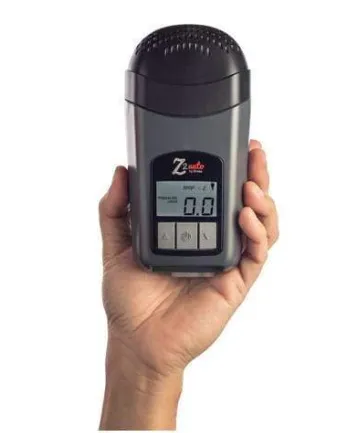
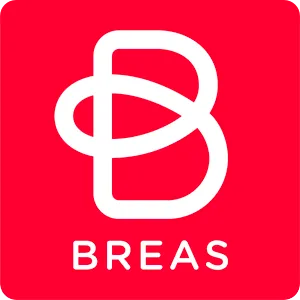
Z2 Travel APAP
- Machine automatically adjusts pressure levels based on your breathing
- Approved for in-flight use
- Compatible with the PowerShell integrated battery system
- Machine automatically adjusts pressure levels based on your breathing
- Approved for in-flight use
- Compatible with the PowerShell integrated battery system
Best Value for Travel
Ideal For:
-
People who have not responded well to standard CPAP therapy
-
Those who travel frequently for work or pleasure
-
Shoppers looking for a device with moisture-free humidification
Who Should Keep Looking:
-
Those who don’t need APAP therapy to sleep comfortably
-
People who are still satisfied with their Z1 travel device
-
Shoppers who are reliant on insurance coverage to purchase PAP supplies
-
Regular Price
$799
-
Weight
0.7 lbs.
-
Warranty
2 years
-
Dimensions
6.48" x 3.30" x 2.02"
-
Noise Rating
26 dBA
Ideal For:
- People who have not responded well to standard CPAP therapy
- Those who travel frequently for work or pleasure
- Shoppers looking for a device with moisture-free humidification
Who Should Keep Looking:
- Those who don’t need APAP therapy to sleep comfortably
- People who are still satisfied with their Z1 travel device
- Shoppers who are reliant on insurance coverage to purchase PAP supplies
Regular Price
$799
Weight
0.7 lbs.
Warranty
2 years
Dimensions
6.48" x 3.30" x 2.02"
Noise Rating
26 dBA
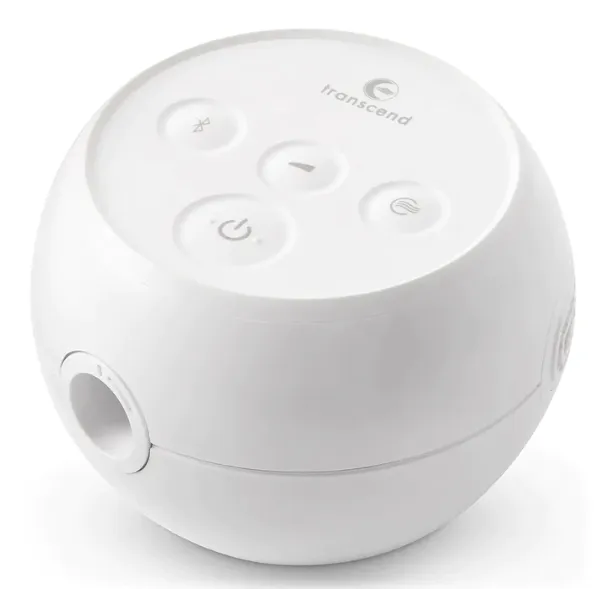
Transcend Micro
- Device adjusts throughout the night to accommodate your breathing patterns
- Exceptionally light design weighs less than 8 ounces
- Drying mode removes moisture from the tubing
- Device adjusts throughout the night to accommodate your breathing patterns
- Exceptionally light design weighs less than 8 ounces
- Drying mode removes moisture from the tubing
Most Portable
Ideal For:
-
Those seeking a PAP machine for long flights
-
Anyone who has found standard CPAP therapy ineffective
-
PAP users who prefer lower pressure levels when exhaling
Who Should Keep Looking:
-
People who have responded well to standard CPAP therapy
-
Anyone who wants a travel-friendly device that’s exceptionally quiet
-
Those seeking a PAP device that’s covered by insurance
-
Regular Price
$870
-
Weight
0.5 lbs.
-
Warranty
2 years
-
Dimensions
3.6" x 3.6" x 2.4"
-
Noise Rating
27 dBA
Ideal For:
- Those seeking a PAP machine for long flights
- Anyone who has found standard CPAP therapy ineffective
- PAP users who prefer lower pressure levels when exhaling
Who Should Keep Looking:
- People who have responded well to standard CPAP therapy
- Anyone who wants a travel-friendly device that’s exceptionally quiet
- Those seeking a PAP device that’s covered by insurance
Regular Price
$870
Weight
0.5 lbs.
Warranty
2 years
Dimensions
3.6" x 3.6" x 2.4"
Noise Rating
27 dBA
How to Choose the Best CPAP Machine for You
In addition to your doctor’s recommendations, you should choose a CPAP machine based on your personal needs and preferences. For example, devices with humidifiers deliver warm, moist air that may be more comfortable if you are prone to congestion or dry nasal passages. If your doctor prescribes a high pressure level, you may want to consider a machine with a ramp setting. Devices with this feature gradually increase the air pressure during a set period of time when you turn on the machine. Some CPAP machines have automatic ramp features that can detect when you fall asleep. Size is another factor to take into account. If you frequently travel, a lighter and more compact CPAP device is the most convenient option. Some machines are specifically designed for travel. However, you should check with your insurance provider regarding coverage for a travel CPAP machine. Some providers don’t cover a travel machine if you’ve already used insurance benefits to purchase an everyday model for home use.Types of CPAP Machines
Positive airway pressure (PAP) machines fall into three general categories:- CPAP: Continuous positive airway pressure machines deliver air at one fixed pressure level prescribed by your doctor. CPAP therapy is a commonly prescribed treatment option for people diagnosed with sleep apnea.
- APAP: Automatic positive airway pressure machines use algorithms to detect breathing patterns and raise or lower air pressure within a prescribed range. Sometimes referred to as auto-adjusting CPAP or auto-CPAP machines, APAP devices are designed to determine the lowest air pressure level needed to keep the airway open during sleep. APAP therapy is sometimes prescribed for people with sleep apnea who have trouble tolerating a fixed pressure rate.
- BiPAP: Bi-level positive airway pressure devices deliver air at one pressure level for inhalation, and a second level for exhalation. Typically, the prescribed air pressure level is lower when exhaling. BiPAP machines are generally the most expensive form of PAP devices. Some BiPAP models feature more advanced algorithms that can identify sleep apnea events and automatically force inhalation if the machine detects that you haven’t taken a breath within a set time period.
How Much Should You Spend on a CPAP Machine?
The average standard CPAP machine costs between $500 and $1,000. Sticker prices increase for more advanced devices. APAP machines generally range from about $600 to $1,600, while the average BiPAP machine falls between $1,700 and $3,000. Most insurance providers cover at least part of the cost of a PAP machine. However, we advise checking with your specific provider before making a purchase. Modern devices typically have built-in data-tracking functions, as insurance companies generally require proof that you are using your machine regularly and the therapy is effective at treating your sleep apnea symptoms.Summary
CPAP therapy has proven effective at treating sleep apnea for millions of people. However, it’s important to choose the most comfortable machine for your specific symptoms and air pressure needs, as discomfort can lead to ineffective treatment. While CPAP is the best and most affordable choice for many people, others may fare better with the varying pressure settings of APAP or BiPAP machines. Ultimately, your doctor’s recommendations should play the biggest role in determining which type of device you choose.Our Top Picks for February 2026
-
 Best Overall
Best OverallAirSense™ 11 AutoSet
-
 Best Features
Best FeaturesLuna G3 APAP
-
 Best Card-to-Cloud
Best Card-to-CloudAirSense™ 10 C2C
Recommended CPAP Machines
Best Overall: AirSense™ 11 AutoSet
The ResMed AirSense 11 AutoSet is one of the sleekest CPAP machines available today. Rather than adhering to a single pressure level during the night like other traditional CPAP machines, the AirSense 11 automatically adjusts pressure based on your breathing. For most people, this means steady airflow when you breathe in and lower pressure when you exhale.
The device features an integrated, heated humidifier. You can manually adjust tube temperature and humidity levels using the machine’s touchscreen, or activate climate control for automatic adjustments throughout the night. For the latter, you’ll need ClimateLineAir heated tubing, which is sold separately.
An auto-ramp feature helps you ease into your therapy with a gradual pressure increase. This can be programmed in 5-minute increments up to 45 minutes. Standard AutoSet and “AutoSet for Her” algorithms are available, the latter of which has gentler pressure transitions that some users find more comfortable. All AirSense 11 owners receive full access to ResMed myAir, an online support network that provides check-ins, sleep coaching, and installation assistance.
As the most expensive version of the AirSense 11, the AutoSet CPAP Machine may be out of reach for shoppers with tight budgets — especially if their insurance coverage is limited. Keep in mind that some insurers require policyholders to try standard CPAP therapy before providing coverage for more advanced devices. If you don’t mind fixed-pressure CPAP therapy, this device may not be worth the investment.
Who It’s Best For:
- People who find fixed-pressure CPAP therapy uncomfortable
- Those prone to congestion
- Shoppers seeking a device with integrated sleep coaching
Highlights:
- Machine automatically adjusts pressure levels based on breathing patterns
- Climate control feature lets you easily change temperature and humidity levels
- Auto-ramp and exhalation relief help you breathe more easily
Best Card-to-Cloud: AirSense™ 10 C2C
The ResMed AirSense 10 Card-to-Cloud (C2C) stands out from other CPAP machines for its ease of compliance. Using a built-in SD card, the device downloads your compliance data and uploads it into cloud-based reporting programs. This streamlined process allows you to meet compliance requirements and receive prescription updates without directly contacting your doctor too frequently.
Like other devices in this ResMed series, the AirSense 10 C2C is equipped with features to help you breathe more easily during CPAP therapy. The machine automatically adjusts pressure levels throughout the night, maintaining steady pressure when you inhale and reducing pressure during exhalation. Many people find this varied pressure delivery more comfortable than one fixed setting. The auto-ramp function also helps you ease into therapy by gradually building pressure up to 45 minutes after you begin.
The AirSense 10 C2C has an integrated heated humidifier with adjustable climate control. You can manually change temperature and humidity on the touchscreen, or set the device to automatically adjust these settings during the night based on your bedroom environment. ClimateLineAir heated tubing is required for the automatic option. All owners receive access to myAir, an online support system that guides new CPAP users through installation and provides sleep-coaching tips.
Since the AirSense 10 C2C is somewhat expensive, this device may not be necessary for people who are generally satisfied with standard CPAP therapy. Those with limited insurance coverage may also want a more affordable machine. That said, the convenience of card-to-cloud reporting might be worth the investment.
Who It’s Best For:
- Those looking for a device that streamlines the data reporting process
- CPAP users who feel more comfortable with flexible pressure settings
- People who are new to CPAP therapy
Highlights:
- Card-to-cloud software sends compliance data directly to your physician
- Automatic climate control adjusts temperature and humidity levels during the night
- Ramp and EPR features improve ease of breathing